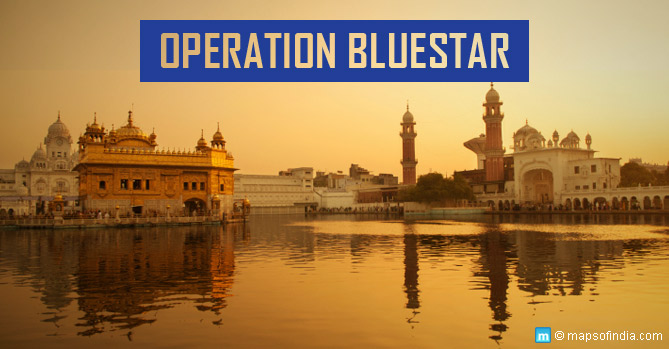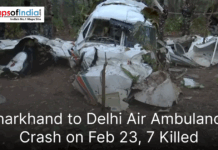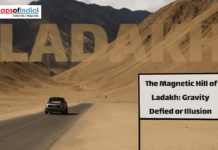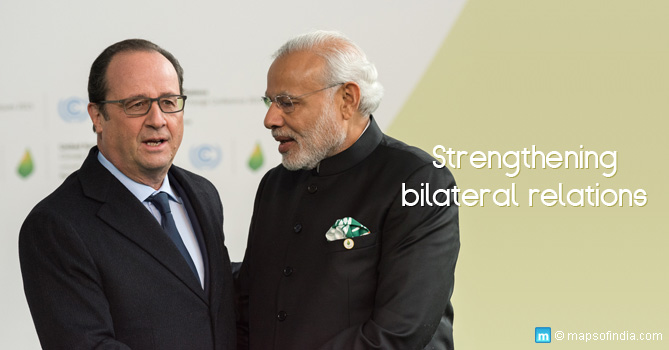6 June 2016 marked the 32nd anniversary of Operation Bluestar, a black day marking one of the darkest moments in the history of post-independence India.
It was on this hot summer day when the Indian Army launched an attack on the Golden Temple in Amritsar to flush out armed militants who had taken over the temple and amassed arms and ammunition for what they believed was a fight for an independent Khalistan.
In the action that followed, several soldiers of the army were killed and an even larger number wounded before all militants holed up inside were killed. In the end, the central figure that raised the call for an independent Khalistan, Jarnail Singh Bhindranwale, leader of Damdami Taksal, lay dead along with scores of his followers and several innocent civilians who had been caught in the crossfire.
Akal Takht, located inside the Golden Temple complex, was severely damaged but what was more damaging was the hurt and resentment felt by all Sikhs when their revered Golden Temple was attacked.
32 years have gone by but bitter memories of that fateful day still continue to haunt many a Sikh. Every year on this day, a memorial service is organized by the SGPC, the supreme religious body that manages the Golden Temple.
The demand for an independent Khalistan has not completely died out yet, with some elements still keeping the demand alive and these voices usually become very vocal especially on this day each year.
On several such occasions, clashes between radical elements and the members of SGPC have taken place within the precincts of the Golden Temple, with each group trying to dominate and dictate the tone and tenor of the anniversary. Resulting clashes have often seen groups going at each other with swords drawn and resulting in injuries.
32nd Anniversary this year
Given the past experience, credit is due to both the management of SGPC and the ruling Akali Dal government, for ensuring that the day passed off relatively peacefully and without any major incident.
There were, however, some pro-Khalistan and anti-state sloganeering, but by and large, the situation was under control.
Earlier, Punjab Chief Minister Parkash Singh Badal along with Avtar Singh Makkar, the SGPC President, made a fervent appeal to people to maintain peace and not indulge in any coercive or violent protests.
This was backed up with extensive security arrangements at the Golden Temple with a large team of SGPC security task force, who were visible in their black turbans.
Outside the temple complex, security personnel drawn from state and central forces had laid extensive security, and also across the state, to check any untoward incident.
Lessons from Operation Bluestar
It’s important for today’s generation to ask what happened in the run-up to Operation Bluestar and why issues were allowed to fester to a point of no return.
Operation Bluestar is a classic example of what unchecked politics can do and how politicians allow situations to build up when issues could be well addressed and matters kept under control.
The detailed sequence of events is well documented but to give readers a brief overview on what really happened, one has to go back to the late 70s. With the failure of the Janata Party to provide the nation with a stable government in the post-emergency era, the nation once again turned to Indira Gandhi-led Congress.
Two parallel factors were in play at the time. One, the Congress Party was raising the stakes in its desire to keep the Akali Dal out of power in Punjab at any cost, and the other, was a Machiavellian General Zia-ul-Haq of Pakistan, who as many others like him, continued to look for an opportunity to get back at India for shearing away East Pakistan and creating an independent Bangladesh, in 1971. And militancy in Punjab provided Pakistan with just that opportunity.
Indira Gandhi was looking for a strong figure within various socio-religious groupings in Punjab, someone who could take on the Akali Dal, and Bhindranwale proved just the right person. However, as Bhindranwale grew in popularity and appeal, he soon began to oppose the centre by taking a strong position on the Anandpur Sahib Resolution.
Anandpur Sahib Resolution demanded Sikhism be recognized as a religion separate from Hinduism, a greater share of irrigated water for Punjab and Chandigarh to be handed over as capital of Punjab. Bhindranwale backed this up with staunch opposition to consumption of tobacco, liquor, drugs and cutting of hair by Sikhs. However, it must be noted that Khalistan was not on his initial agenda.
Political dithering and procrastination by the Congress government at the centre, as well as murky politics played out at the state level, led to the movement being supported and financed by an eager Pakistan. Militants received training, arms and ammunition of all kinds from across the border. The rest is history.
Has anything really changed?
Punjab has by and large remained a peaceful and progressive state. Militancy has been contained but the state is now victim to another kind of problem, perhaps more serious than the days of militancy in the 80s. The state is reeling under widespread abuse of alcohol and drugs, most of which has been coming from across the border.
In a redux of the 80s, Pakistan has once again been utilizing the state’s proximity to the border by sending in large quantities of drugs. The problem of drug and alcohol abuse has reached epidemic levels but this could not have been possible without tacit support of powerful politicians, bureaucrats and elements within the Police, all of whom have been profiting from the illegal trade and at the expense of youth in the state, who have fallen prey to easy availability of drugs and alcohol.
In the 80s, politicians were busy looking at winning their own political games at the cost of the state, and now in 2016, not much seems to have changed. We once again see politicians living in denial and allowing the problem to fester.
Through the latter part of the 80s, people of Punjab finally turned their backs to militancy, and one hopes that the same will happen once again in the fight against drug and alcohol abuse.
The nation would like to see people of Punjab realize their true potential and take the state on a progressive path of social and economic development, one that even wily politicians will not be able to derail. The people owe it to themselves.
Related Information :
Jallianwala Bagh Massacre: Story, History, Facts, Why it Happened






